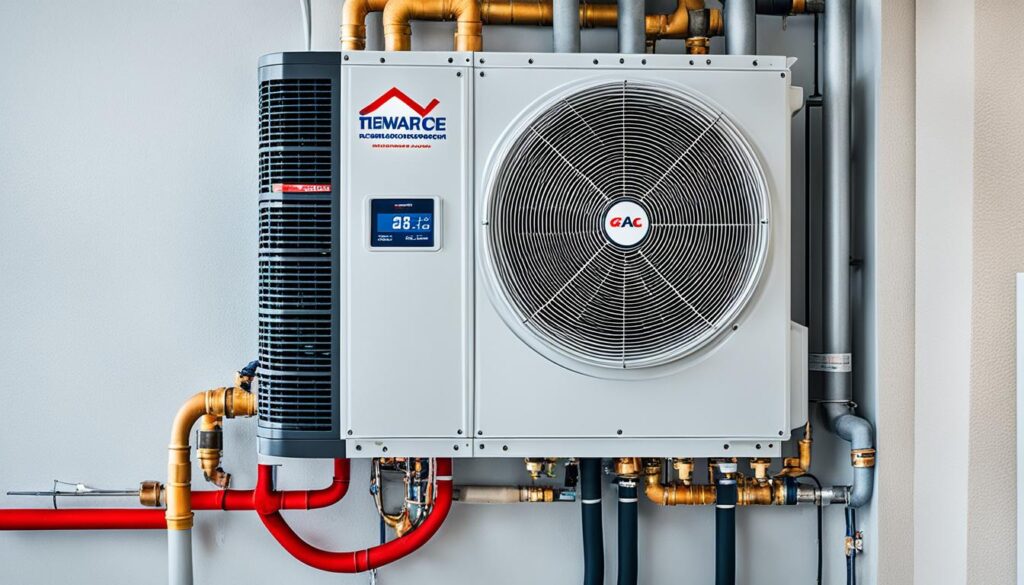In the midst of summer, a cool breeze from your air conditioner (AC) feels like a blessing. But, have you thought about if your AC is part of something bigger? This larger thing is an HVAC system, designed to handle the entire indoor environment all year. By knowing what air conditioning can do compared to HVACs, you can choose what’s best for you.
People often mix up AC and HVAC, treating them like they’re the same. But, they’re quite different. AC focuses only on cooling your space, making it a sweet escape from the heat. On the other hand, HVAC does more. It not only cools but also heats, improves air quality, and manages the indoor environment in every season.
Key Takeaways
- AC units are specifically geared for cooling, while HVAC systems offer versatile temperature and air quality management.
- Understanding the range of HVAC functionalities can lead to better climate control choices.
- Having clarity on whether you need just air conditioning or a complete HVAC system can impact overall indoor comfort.
- HVAC incorporates additional components like heat pumps and gas furnaces, essential for heating solutions.
- Recognizing the distinction between AC and HVAC is crucial for effective energy usage and maintaining air quality.
Understanding the Basics of AC and HVAC Systems
The air conditioning industry has changed a lot thanks to new technology. Now, we have efficient systems for better climate control. It’s important to know the difference between AC (Air Conditioning) and HVAC (Heating, Ventilation, and Air Conditioning). This helps understand their uses in different places.
AC systems cool the air. They work well in places that only need cooling. You can find small units for one room or big central systems for entire buildings.
HVAC systems do more. They can cool or warm up a space. They use heat pumps for heating and cooling. And, they have gas furnaces for just heating, good in cold areas. Plus, they use ventilation systems for fresh air and proper air movement indoors.
- Heat pumps: They can heat or cool your space, making HVAC systems a great choice for all times of the year.
- Gas furnaces: They warm up by burning gas or propane, which is perfect for chilly places.
- Ventilation systems: They keep the air fresh by moving it well and removing pollutants.
Knowing these differences helps people choose the right system for their needs. Whether at home, the office, or other places, this information is key.
The Unique Functions of Air Conditioning (AC) Units
Air conditioning units are key for making indoor spaces comfortable and healthy. They work by cooling efficiency and improving air quality. This is achieved through cooling and removing moisture from the air.
Window units and central AC systems are the main choices for cooling. They are good for different needs. Let’s see how they fight heat and moisture to make the air better indoors:
- Window Units: Perfect for one room, they make the area cool and comfortable. They are affordable and save energy. This is because they focus on cooling specific areas you use.
- Central AC Systems: These are a full-home solution. They cool and dehumidify all rooms evenly. Plus, they clean the air, making it healthier by removing dust and pollen.
Both systems are great at removing extra moisture from the air. This is very important in places like Southwest Florida. It stops mold and makes breathing easier.
When it comes to cooling efficiency, central ACs are top. They might cost more at first, but they use less energy over time. They keep recycling and cooling the air inside, while taking out moisture.
Choosing between the two types depends on your needs. Think about the space, the climate, and how much you want to save energy. Both window and central units are vital for air quality and comfort against the heat.
Components and Operation of an HVAC System
An HVAC system is crucial for keeping us thermal comfort in homes and workplaces. Knowing its parts makes it easier to keep it working well. This also helps it do its job better.
The core of an HVAC system has several important pieces. They either add heat or cool air. This includes furnaces, heat pump systems, and evaporator coils. They all team up to manage the air indoors.
- Furnaces: Furnaces create heat by burning things like propane or natural gas. They then spread the warmth around your space through air ducts. This makes the place cozy when it’s cold outside.
- Heat Pump Systems: Heat pumps work in all seasons. They take heat from the air or ground to warm your space in winter. Then, they move heat outside to cool it in summer. They save energy and work well in mild places.
- Evaporator Coils: These are key for cooling. As your air conditioner runs, these coils use a special fluid to suck the heat out of the air. This cools your place down.
- Ductwork Management: Good ductwork means air moves just right. Well-designed ducts push out and bring back air efficiently. This keeps your HVAC system running smoothly and you comfortable.
To keep the right indoor temperature, your HVAC system needs care. This means checking and fixing furnaces, heat pump systems, coils, and ducts often. Doing this helps your system last longer and work better.
Comparing the Energetic Efficiency of AC and HVAC
When choosing air conditioning, think about energy costs and system reliability. Both AC and HVAC keep us comfortable, but their costs and performance are different. These differences come from their designs and where they are used.
Energy Efficiency: ACs are great for cooling and saving energy. They do well in hot months. HVACs, on the other hand, use more energy because they heat and cool. This makes them better for a year-round comfortable temperature.
- Ease of Maintenance: HVACs are designed for varied weather, so they need less maintenance. This means their parts last longer because they’re not always stressed by extreme weather.
- Cost-Effectiveness: Installing an HVAC might cost more upfront, but it can save money over time. The mix of AC and heat in one system can lower energy costs and maintenance needs.
In places like Southwest Florida, where it’s not too cold, homeowners must consider their needs. A simple AC with a heat kit might be enough. It keeps energy costs low while making their home comfy.
Never forget about maintenance. Taking care of your cooling system keeps it running well. This is true for both standalone ACs and complex HVACs. Good maintenance means lower bills and a reliable system.
To wrap up, think about reliability and care when picking between AC and HVAC. It’s all about finding what suits you best, considering where you live and what you find important. A thoughtful choice meets your needs and saves you money.
Installation and Maintenance: What to Expect
Professional installation and air conditioning maintenance are key for your HVAC system’s long life and efficient operation. These tasks are vital because HVAC systems are made of many parts. They need to be handled with care and skill.
Handling HVAC servicing means more than just keeping things cool. It’s about maintaining the comfort and efficiency of your place. Homeowners need to be ready for these steps for their HVAC and AC units:
- Professional Installation: Installing things right from the start is important for lasting performance. For HVAC setups, everything from the AC to the ductwork must be done perfectly.
- Air Conditioning Maintenance: Regular checks and cleanings help the system run smoothly, especially when it’s working the hardest. This upkeep includes changing filters, checking coolants, and doing tests to catch issues early.
- HVAC Servicing: It’s crucial to check on the heating, cooling, and control parts of your system. This keeps everything working well together, keeping your place just right.
Getting regular maintenance by skilled pros is a must. It stops big problems, keeps everything working right, and makes sure your place is comfy all through the year. With proper care, your systems will not just last but will also save you both money and stress in the future.
Ventilation: The V in HVAC
Ventilation in HVAC goes beyond moving air. It’s key for indoor air quality and controlling moisture. The right ventilation not only circulates air well but also makes ductwork work better. This leads to a healthier, more comfortable space.
- Enhancement of indoor air quality by filtering out pollutants and allergens.
- Regulating humidity is important for moisture control to stop mold and mildew.
- Consistent air circulation helps spread and weaken indoor pollutants.
- Better ductwork effectiveness shares conditioned air efficiently.
Advanced ventilation is key for top-notch HVAC. It handles air quality and exchange well. This is far more sophisticated than basic A/C that cools, but doesn’t focus on fresh air. With high-tech ventilation, HVAC tackles pollution and moisture, making spaces comfy and healthy.
What is the difference between AC and HVAC?
Knowing the difference between air conditioning differentiation and HVAC comprehensive control is key. It helps in keeping the indoor environment comfortable. These systems aim to make our indoor spaces nice and healthy. But, they work in different ways and for different places.
- Air Conditioning Systems: They cool the air, ideal for hot places. They are easy to use and install.
- HVAC Systems: These handle heating, ventilation, and cooling. They are more complex and fit many temperature needs.
Choosing between AC and HVAC depends on where you are, how big the space is, and the climate. For hot places, AC may be enough. But, areas with changing weather could use HVAC’s flexibility.
Both systems are important for comfort. But, knowing their differences is crucial. It helps you choose what’s best for you, saving money over time. This choice is important for keeping indoor spaces just right.
Conclusion
When looking at air conditioning and HVAC options, understanding their unique features is key. Air conditioners work best in places needing cooling. They greatly reduce the heat and humidity during hot times. They are perfect for places with hot weather or where just one room needs extra coolness.
In contrast, HVAC systems are great for all-round heating and cooling. They cover heating, ventilation, and air conditioning for big areas. They make sure everywhere, from fully comfortable offices to healthy homes, stays just right.
Deciding on an AC or HVAC system involves many factors. Think about what your space needs, saving energy, and your budget. Getting professional advice can help you navigate the technical info. This choice will make your indoor space more comfortable and energy-efficient. Trusting the right experts can improve your life, making your indoor areas more inviting and comfortable.





